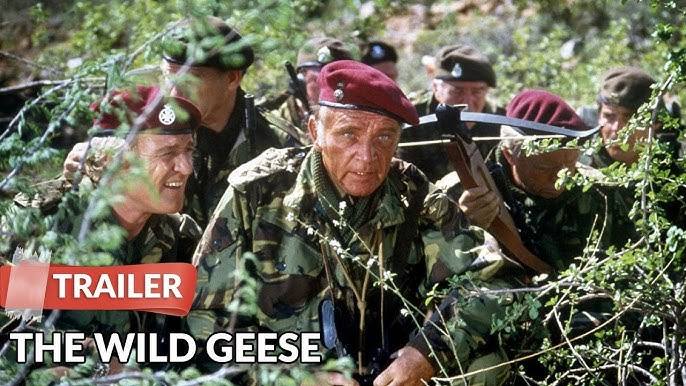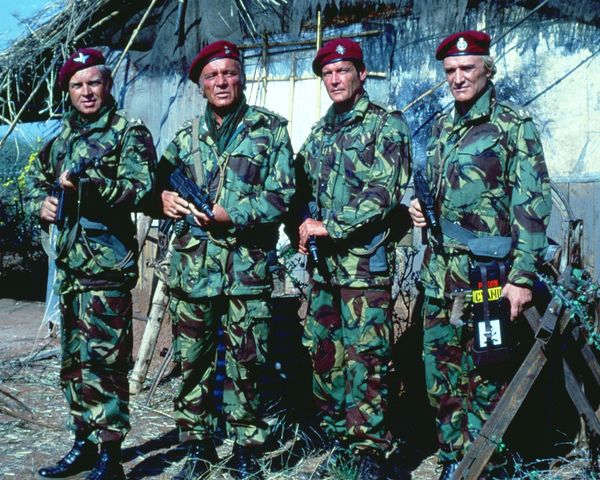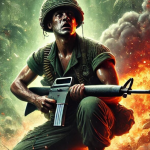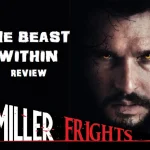The Wild Geese (1978): A Classic War Drama with a Veteran Ensemble Cast

The Wild Geese is a 1978 British war film directed by Andrew V. McLaglen, based on Daniel Carney’s novel of the same name. With a star-studded ensemble cast that includes Richard Burton, Roger Moore, Richard Harris, and Hardy Krüger, the film delivers an intense, action-packed military drama while also delving into the moral ambiguities of mercenary life.
The Plot
Set in the turbulent political landscape of 1970s Africa, The Wild Geese tells the story of a group of mercenaries led by Colonel Allen Faulkner (played by Richard Burton), a seasoned British soldier-for-hire. Faulkner is recruited by a wealthy British businessman, Sir Edward Matherson (Stewart Granger), to assemble a team of elite mercenaries for a dangerous mission: rescuing the deposed African leader, Julius Limbani (Winston Ntshona), from a brutal dictator’s clutches. Limbani, a key political figure, is being held captive in a remote, heavily guarded location, and his release is crucial to restoring peace and stability in his country.
Faulkner, known for his leadership and military expertise, handpicks a diverse group of seasoned soldiers for the mission. Among them are Captain Rafer Janders (Richard Harris), a skilled strategist with a strong sense of loyalty, and Lt. Shawn Fynn (Roger Moore), a daring pilot with a quick wit and an irreverent attitude. The mercenaries, from different backgrounds and with various personal motivations, form a tightly-knit team, despite the tension and clashes among them.
The Mission and Its Challenges
The mercenaries’ mission is fraught with danger from the outset. Infiltrating hostile territory, they must navigate political instability, betrayal, and brutal opposition forces. The mission quickly becomes a race against time, as Faulkner and his team engage in guerrilla warfare, navigate the African wilderness, and face deadly combat in their attempt to extract Limbani.

What sets The Wild Geese apart from other war films is its focus on the personal stories of the mercenaries. Each character brings a unique perspective to the mission, with their own moral dilemmas, emotional baggage, and inner conflicts. Faulkner, burdened by his leadership responsibilities, must confront the harsh realities of war, while Janders, a single father, struggles with the knowledge that he may never return to his son. Fynn, on the other hand, serves as the film’s lighter, more comedic element, though his character is also deeply affected by the violence around him.
Themes of Loyalty and Betrayal
The Wild Geese explores deeper themes beyond action and adventure. Loyalty is a central theme, as the mercenaries, despite their professional motives, develop strong bonds of camaraderie. At the same time, the film does not shy away from the brutal realities of mercenary work, including betrayal, both personal and political. The mission, while noble in its goal of rescuing Limbani, is also clouded by the underlying motives of those funding it, highlighting the moral complexities of military intervention for profit.
Julius Limbani, the political prisoner, represents a moral center for the group. As the mercenaries interact with him, they are forced to reckon with the human cost of their mission. His presence adds depth to the narrative, as his philosophical reflections on leadership and justice contrast with the mercenaries’ more practical and survivalist attitudes.
The Cast and Performances
The film’s powerhouse performances are among its strongest elements. Richard Burton delivers a commanding portrayal of Colonel Faulkner, embodying the weariness and resolve of a leader torn between duty and morality. Richard Harris is equally compelling as Janders, whose deep emotional conflict and sense of duty drive much of the film’s tension. Roger Moore, in a role quite different from his James Bond persona, adds charm and a touch of humor as the roguish Lt. Fynn, while Hardy Krüger, as the German mercenary Lt. Pieter Coetzee, delivers a subtle performance that underscores the complex dynamics within the team.
Winston Ntshona’s portrayal of Julius Limbani is powerful, adding gravitas to the political aspect of the story. His character, while physically imprisoned, becomes a symbol of hope and change for his people, providing the moral backbone of the narrative.
A Realistic and Gritty Action Film
The Wild Geese is known for its gritty realism in depicting combat and the harsh conditions of mercenary warfare. The action sequences, from the initial rescue operation to the tense and explosive firefights, are executed with precision, giving the film an authentic and suspenseful atmosphere. McLaglen’s direction ensures that the action serves the story, keeping the audience invested in both the high-stakes mission and the characters’ emotional journeys.
The African setting, though a fictional country, adds a vivid backdrop to the film, with stunning landscapes and difficult terrain that serve as both a challenge and a visual feast. The use of practical effects and real locations lends a sense of realism to the combat scenes, which were praised for their intensity and authenticity.
Legacy of The Wild Geese
Since its release, The Wild Geese has become a classic in the war and action genres. Its blend of action, character-driven storytelling, and moral complexity sets it apart from many other military films of its time. The film’s exploration of the mercenary lifestyle, its emphasis on loyalty and sacrifice, and its depiction of war’s human cost have resonated with audiences for decades.
For fans of military dramas and war films, The Wild Geese remains a must-watch. Its combination of star power, thoughtful storytelling, and exhilarating action makes it a standout entry in the genre, offering both a thrilling cinematic experience and a poignant reflection on the complexities of war and soldiering.
Final Thoughts
The Wild Geese is more than just an action-packed war film; it’s a story of brotherhood, sacrifice, and the moral dilemmas faced by those who operate in the shadows of global conflict. With a stellar cast, gripping narrative, and a thought-provoking exploration of loyalty and betrayal, the film has earned its place as a classic in the world of war cinema.











